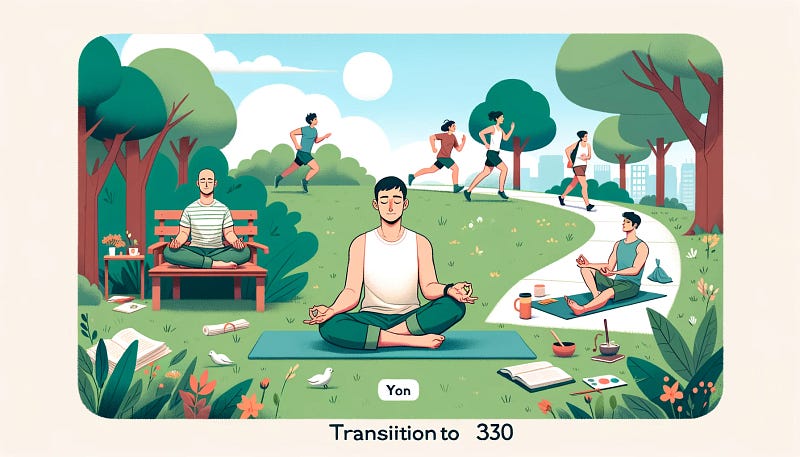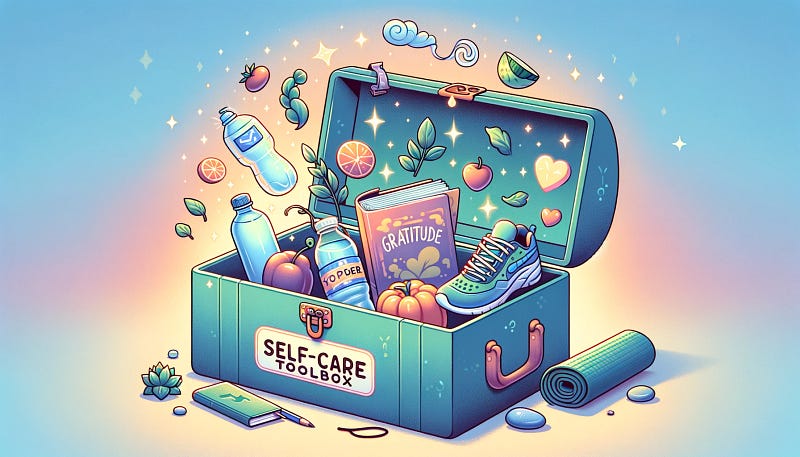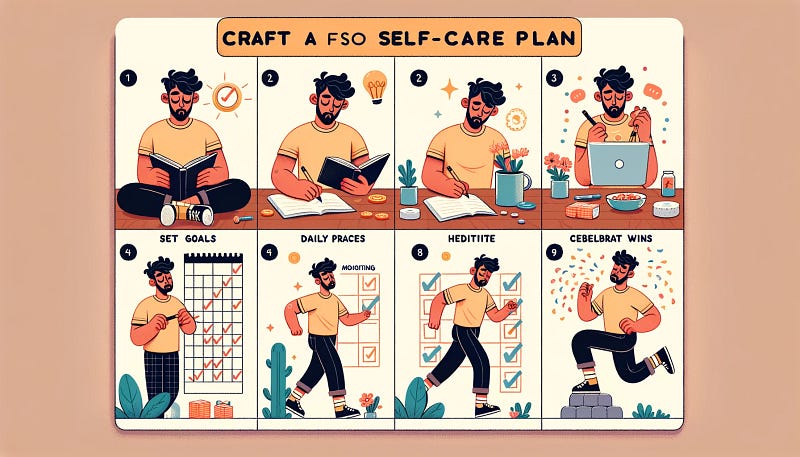Self-Care as the Keystone of Work-Life Harmony
Discover how self-care practices can revolutionize your work-life balance. Learn actionable tips to blend professional success with personal health and happiness, fostering a life of fulfillment and well-being.

The Rising Tide of Self-Care in Work-Life Balance
Once upon a time, in a bustling city filled with the constant hum of activity, there lived a person named Alex. Alex, like many of us, juggled a demanding job, a vibrant social life, and a myriad of personal interests. Each day felt like a race against the clock, trying to squeeze in just one more task, one more meeting, or one more moment with loved ones. The concept of “balance” seemed like a distant dream, something others spoke of but never truly attained.
However, as the weeks turned into months, Alex began to notice a shift. Conversations with colleagues no longer centered solely around deadlines and projects but also touched on weekend hikes, meditation sessions, and cooking classes. Articles and social media feeds, once dominated by productivity hacks and career advice, now overflowed with tips on mindfulness, the importance of sleep, and the joys of unplugging. It was as if the world had collectively realized that self-care was not just a luxury reserved for the few but a necessity for all.
This growing recognition of self-care as essential for maintaining a healthy work-life balance is not just anecdotal. It reflects a broader societal shift towards acknowledging that our well-being is multifaceted, requiring attention to both our professional ambitions and personal needs. The realization that self-care acts as a foundation for achieving work-life harmony is gaining ground, challenging the old adage that success comes at the expense of personal health and happiness.
The purpose of this article is to explore this transformative power of self-care. We will delve into practical strategies for integrating self-care into our daily routines, ensuring that our professional ambitions flourish alongside our personal well-being. Through this journey, we aim to demonstrate that self-care is not merely an act of indulgence but a critical component of a balanced and fulfilling life.

Understanding Self-Care — More Than a Trend, A Lifestyle Shift
In today’s fast-paced world, the term “self-care” has become a buzzword. But what does it really mean? Self-care is not just about treating yourself to a spa day or indulging in your favorite dessert. It’s a vital component of a healthy lifestyle, especially in the context of modern life’s demands and work pressures.
Historically, self-care was not as prominently discussed or recognized as it is today. In the past, the focus was more on survival and meeting basic needs rather than nurturing one’s mental and emotional well-being. However, as society has evolved, so has our understanding of health and wellness. The historical evolution of self-care reflects a growing awareness of the importance of mental and emotional health, alongside physical health.
Today, self-care is recognized as an essential practice for coping with the stresses of modern life. It’s about taking the time to attend to your own needs, ensuring that you’re mentally, emotionally, and physically fit to handle the challenges that come your way. This shift towards recognizing the importance of self-care is partly due to the increasing pressures of work. With longer hours, higher expectations, and the blurring lines between work and home life, especially in the digital age, the need for self-care has never been more critical.
Self-care is not a luxury; it’s a necessity. It’s about making conscious choices to take care of your well-being, which in turn, enhances your ability to succeed professionally. By prioritizing self-care, you’re not only improving your own life but also setting a foundation for sustained professional success. This lifestyle shift towards embracing self-care is essential for both personal well-being and professional achievement.
In conclusion, self-care in the context of modern life is about recognizing and addressing your own needs in a holistic manner. It’s a lifestyle shift that acknowledges the importance of your well-being as the foundation for achieving work-life harmony and professional success. As we move forward, embracing self-care will continue to be a critical component of navigating the complexities of modern life.

The Self-Care Toolbox — 10 Practices to Transform Your Daily Routine
Self-care is like having a toolbox. Inside, you’ve got tools that help fix up your day, making sure you’re feeling good and ready for anything. Let’s open up this toolbox and check out 10 simple tools you can use to make every day a little better.
1. Morning Minutes: Start your day with a few minutes just for you. Maybe it’s sipping coffee in silence or stretching. It’s like giving your day a calm hello.
2. Move Your Body: Find a way to get moving that you enjoy. Dance in your living room, take a walk, or try a yoga video. It’s like a high-five for your health.
3. Healthy Bites: Eat foods that make you feel good. Add an apple to your lunch or munch on some carrots. It’s like fueling your engine with the good stuff.
4. Water Breaks: Drink water throughout the day. Keep a bottle with you and take sips often. It’s like watering a plant, but the plant is you.
5. Breathing Spaces: Take short breaks to breathe deeply. Inhale, exhale, and watch your stress float away. It’s like hitting the reset button on your calm.
6. Gratitude Moments: Think of one thing you’re thankful for each day. It could be as simple as a sunny sky or a friend’s text. It’s like a little thank-you note to life.
7. Learning Time: Learn something new, whether it’s a fact, a skill, or a hobby. It’s like adding a cool new tool to your toolbox.
8. Laugh Out Loud: Find a reason to laugh every day. Watch a funny video or joke with a friend. It’s like sunshine for your soul.
9. Kindness Acts: Do something nice for someone else. Hold the door or give a compliment. It’s like giving a gift that makes two people happy.
10. Nighttime Reflection: End your day by thinking about what went well. It’s like giving your day a high-five before you say goodnight.
These tools aren’t just random; they’re backed by places that know a lot about self-care, like BetterUp and the Maryland University of Integrative Health. And they’re not just for reading about. Try them out, make them your own, and watch how they can change your day for the better.

The Ripple Effect of Neglect — When Work Overwhelms Life
Imagine this: You’re juggling a full-time job, personal projects, and family responsibilities. At first, it feels manageable. You’re powering through the days, fueled by caffeine and adrenaline. But slowly, the energy fades. You start skipping meals, missing out on sleep, and foregoing exercise. This isn’t just a busy week; it’s become your lifestyle.
The Physical Toll: Your body begins to protest. Headaches become frequent visitors, and your immune system waves the white flag, making you more susceptible to colds and infections. You’re tired all the time, yet when it’s time to sleep, you’re wide awake, running through to-do lists in your head.
The Emotional Toll: Emotionally, you’re on a rollercoaster. Small setbacks feel like catastrophes. You’re irritable at home and withdrawn at work. The joy you once found in hobbies and spending time with loved ones has dimmed. You’re there, but not really present.
The Professional Toll: At work, the quality of your output begins to suffer. Deadlines are missed, and the innovative ideas that once flowed so freely now seem out of reach. Your boss and colleagues take notice. The reputation you’ve worked so hard to build is at risk.
This isn’t a hypothetical scenario. It’s a vivid picture of burnout, a state of emotional, physical, and mental exhaustion caused by prolonged stress. It’s what happens when we neglect self-care, ignoring our body and mind’s need for rest, nourishment, and relaxation.
Burnout doesn’t just affect the individual; it has a ripple effect. Relationships suffer as we become less patient and more withdrawn. Professional life takes a hit as our capacity to perform and innovate declines.
But there’s hope. The key to avoiding this downward spiral lies in recognizing the importance of self-care. It’s not a luxury; it’s a necessity. By crafting a personal self-care plan, we can ensure that our professional ambitions flourish alongside our personal well-being. This plan isn’t about grand gestures; it’s about integrating small, manageable practices into our daily routine. Practices that recharge our batteries, rather than deplete them.
In the next chapter, we’ll explore how to create this personal self-care plan. A plan that’s tailored to your unique needs, helping you maintain balance and prevent burnout. It’s about taking proactive steps towards a healthier, happier life.

Crafting Your Personal Self-Care Plan — A Step-by-Step Guide
Creating a personal self-care plan is like drawing a map for a journey toward better health, happiness, and balance. It’s about making a commitment to yourself to prioritize your well-being every day. Here’s how you can start this transformative journey.
Step 1: Self-Assessment
Begin by taking a moment to really listen to yourself. Ask yourself questions like:
- What parts of my life need more attention right now?
- When do I feel the most stressed or overwhelmed?
- What activities make me feel happy and energized?
This self-assessment is your starting point. It helps you understand your current state and identify areas where self-care is needed the most.
Step 2: Identify Your Self-Care Needs
Based on your self-assessment, pinpoint specific self-care needs. These could range from needing more physical activity, seeking emotional support, or finding time for hobbies that make you happy. Remember, self-care is personal. What works for someone else might not work for you.
Step 3: Set Realistic Goals
Now, set realistic and achievable goals for each of your self-care needs. If you’ve identified a need for more physical activity, a goal could be as simple as a 10-minute walk every day. The key is to set goals that are manageable and not overwhelming.
Step 4: Create Your Self-Care Plan
With your goals in mind, draft your self-care plan. This plan should include:
- Daily Practices: Small actions you can take every day, like drinking enough water or practicing gratitude.
- Weekly Activities: Bigger activities that require more time, such as exercising, meal prepping, or spending time with loved ones.
- Long-Term Goals: Larger objectives you’re working towards, like running a 5K or learning a new skill.
Step 5: Track Your Progress
Keep a journal or use an app to track your self-care activities and progress towards your goals. This will help you stay accountable and make it easier to see what’s working and what’s not.
Step 6: Review and Adjust
Regularly review your self-care plan. Life changes, and so will your needs and priorities. Don’t be afraid to adjust your plan as necessary. The goal is to make self-care a flexible and enjoyable part of your life.
Step 7: Celebrate Your Wins
Finally, celebrate your successes, no matter how small. Acknowledging your progress is an important part of self-care. It reinforces the value of taking care of yourself and motivates you to continue.
Creating a personal self-care plan is a journey of self-discovery and growth. It’s about making a commitment to yourself to prioritize your well-being. By following these steps, you can create a plan that supports your health, happiness, and work-life harmony. Remember, the goal is not perfection but progress. Start small, be kind to yourself, and enjoy the journey towards a more balanced and fulfilling life.

Conclusion: Embracing Self-Care for Sustained Work-Life Harmony
Self-care isn’t just a buzzword; it’s the bedrock of a balanced life. Throughout this article, we’ve explored how self-care is crucial for maintaining harmony between our work and personal lives. It’s clear that taking care of ourselves isn’t selfish — it’s essential.
The Importance of Self-Care
We’ve seen that self-care goes beyond the occasional spa day — it’s about making consistent choices that support our overall well-being. From setting boundaries to prioritizing rest, self-care practices help us stay energized, focused, and more productive in all areas of life.
Key Takeaways
- Self-Care is a Lifestyle: It’s about integrating small, daily practices that add up to big changes over time.
- Personalized Approach: There’s no one-size-fits-all. Your self-care plan should reflect your unique needs and lifestyle.
- The Dangers of Neglect: Ignoring self-care can lead to burnout, affecting not just our health, but also our relationships and career.
- Actionable Strategies: We’ve provided practical tips and a step-by-step guide to help you create and stick to a self-care plan.
Your Call to Action
Now, it’s your turn. Start small. Maybe it’s taking a short walk, turning off your phone for an hour before bed, or setting aside time each week to do something you love. Whatever it is, make that commitment to yourself.
Remember, self-care isn’t a one-time event — it’s a continuous journey. Review and adjust your plan as your life evolves. Celebrate your successes, learn from the setbacks, and keep moving forward.
Take that first step today towards integrating self-care into your life. Your future self will thank you for the sustained well-being and professional fulfillment that come from living a balanced life. Let’s make life better, one step at a time.
✨Don’t forget to 👏 and comment💬 to share your views/thoughts. ✨
Thanks for reading. ❤️ Leave your views/thoughts💭, I’d love to hear from you! ✨
If my words touched your soul, please consider supporting my journey: [Donate Link](https://www.buymeacoffee.com/tokyofullstack). Your generosity weaves into every story. ❤️







